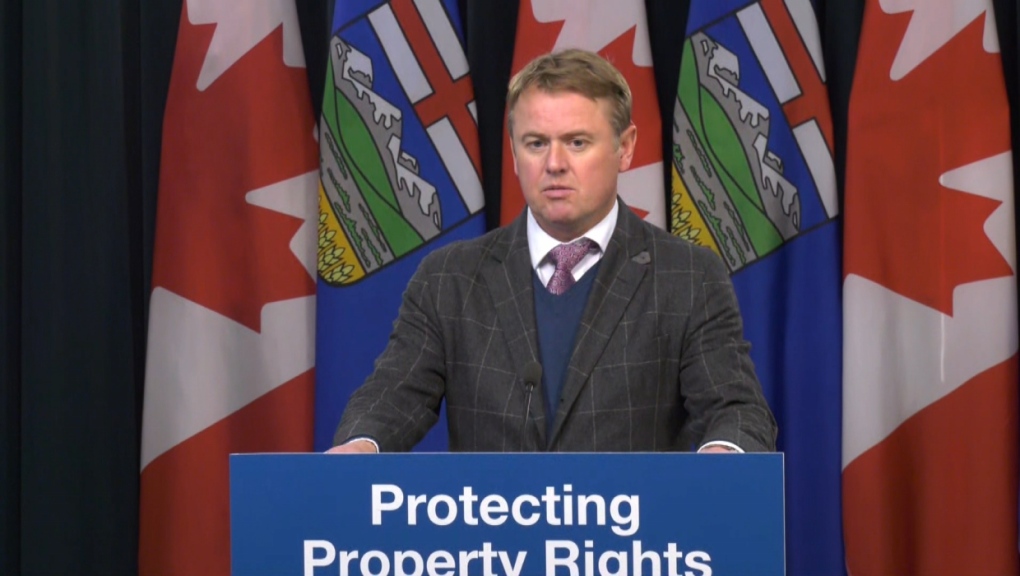UCP hopes to eliminate 'squatters rights' in Alberta
 Tyler Shandro says The Property Rights Statutes Amendment Act, 2022, would abolish the ability of squatters to make a claim and give private landowners the same protections once only reserved for government.
Tyler Shandro says The Property Rights Statutes Amendment Act, 2022, would abolish the ability of squatters to make a claim and give private landowners the same protections once only reserved for government.
Alberta's UCP government wants to get rid of the province's so-called "squatter's rights."
Minister of Justice Tyler Shandro announced the Property Rights Statutes Amendment Act, 2022, on Monday.
If passed, the bill would amend the Law of Property Act, the Land Titles Act and the Limitations Act, eliminating Alberta's adverse possession laws.
Currently, the laws allow a person who has occupied another person’s land for 10 years to claim ownership of that land. Claims can only be made against private landowners; public land, municipal land and irrigation districts are exempted.
"This is not the first time that a bill has been introduced in Alberta's legislature to abolish adverse possession," Shandro said Monday. "There have been previous attempts to make this change through private members bills, but none of them have been successful."
"I hope this time will be different, because Albertans have been saying that they want this change for over a decade."
Adverse possession laws have often been used in land disputes in rural areas, where property lines may be unclear.
"Possession" can mean anything from building a fence that cuts through someone else's property to actually living on someone's land.
Existing laws say anyone "occupying" someone else's land must be doing it visibly, excluding the actual land owner from using it, and the land owner must be aware of it.
"If passed, this act will bring peace of mind to Alberta's landowners, it will allow them to use and enjoy the land that they rightfully own without having to worry about whether someone can take it away," said Shandro.
"Updated legislation would send the clear message that there is nothing to be gained from squatting on someone's land."
CTVNews.ca Top Stories

At least 4 buildings burned at Jasper Park Lodge, others damaged: Fairmont memo
The Fairmont Jasper Park Lodge said Thursday afternoon most of its structures are "standing and intact," including its iconic main lodge.
Major Canadian bank dealing with direct deposit outage on pay day
Scotiabank has acknowledged technical difficulties affecting direct deposits as clients report missed payments Friday morning. On Friday morning, the bank's client services phone line was playing an automated message assuring customers that work was underway to rectify the outage.
Elon Musk's estranged daughter calls out his 'entirely fake' claims about her childhood
Vivian Jenna Wilson, Elon Musk's estranged daughter, publicly refuted several recent anti-trans statements her Tesla CEO and X owner father has made about her.
Reported rate of child pornography increased 52% in 2023, total crime up 3%: Statistics Canada
Last year, reported child pornography cases increased by more than 50 per cent in Canada, in part due to more cases being sent to police by specialized internet child exploitation units, according to a Statistics Canada report.
Justin Timberlake's attorney disputes he was intoxicated when arrested for DWI
A hearing in the case of Justin Timberlake being accused of driving while intoxicated was held Friday, where an attorney for the singer disputed his arrest in June.
What we know about 'malicious' attack on French train network ahead of Olympics opening
French transport was thrust into chaos Friday just hours ahead of the Olympics 2024 opening ceremony after a series of co-ordinated 'malicious acts' upended high-speed train lines.Here's what happened and what we know so far.
When Barbie learned what a gynecologist was, so did many other people, according to new study
A new study published Thursday in the journal JAMA Network Open has found that the ending in the 2023 blockbuster film 'Barbie' had an influence on online search interest in terms around gynecology, the branch of medicine that deals with women’s reproductive health.
Canada Soccer head investigating 'systemic ethical shortcoming' amid spying scandal
Canada Soccer chief executive officer Kevin Blue said he was investigating a potential 'systemic ethical shortcoming' within the program but has not considered pulling the women's soccer team from the Paris Olympics due to a drone spying scandal.
Federal government posts $3.9B deficit in April, May
The result for the April-to-May period compared to a $1.5 billion surplus for the same stretch last year.






























